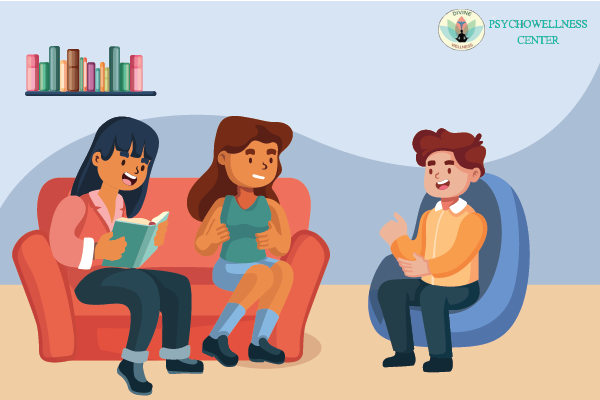Same-sex couples and heterosexual couples have a lot in common. The social setting in which they live is very different, partly because of the pressures of the dominant heterosexual culture and conventional expectations of gender roles within a partnership, even though their daily activities are frequently comparable.
Many same-sex couples may experience tremendous stress if their everyday supports—including family, religious, legal, social and economic support—are absent from their life. The impacts of “minority stress,” or the effects of coping with frequently unfavorable social settings, always present to some amount in same-sex couples. Members of these couples have encountered societal discrimination in different ways and have dealt with it inwardly in different ways. Despite living in a sometimes hostile environment, many same-sex partnerships persist and are as solid as cohabitating heterosexual unions, which is a testament to the fortitude of the individuals involved.
Norms for Gender
According to traditional gender norms, males are instrumental and women are relational. These gender-based presumptions have some basis in reality, which can be used to comprehend same-sex relationships. Psychological femininity suggests a dedication to the relationship, a propensity to satisfy a partner’s needs, and efforts to mend rifts between them. On the other hand, psychological masculinity frequently reflects rivalry, independence, and lack of emotionality within the context of the partnership. These people frequently allow the situation to get worse or leave the partnership when issues arise. In order to find mutual fulfillment, gay male couples frequently rely on social interchange (such as helping one another out) rather than emotional or romantic elements.
Couples can establish a strong level of early rapport and experience a profound fusion due to the similarities between biological sex and gender role indoctrination. They are able to comprehend, offer, and receive and are aware of what appeals to people of their own sex.
Discrepancies in Stages
After being conscious of same-sex desire for the first time, it typically takes a person several years to progress through a variety of phases before completely developing a sexual minority identity. Given that many of these pairs merge before the partners have finished developing their separate identities, stage disparities are frequent in many same-sex relationships. As a result, participants pursue their own sexual orientation growth while juggling the difficulties of a changing romantic relationship. Even though issues of loyalty and betrayal frequently arise, rarely do couples experience their problems as stage differences. The degree of “openness” that each couple considers acceptable in familial ties, jobs, the community, and friendships usually causes conflict as a result of these stage differences. Many relationships are able to get past this problem, but some cannot.
Partner differences in relationship stages are prevalent, just like in heterosexual partnerships. When one person starts to mature personally and the other sees it as abandonment, for instance, or when one person wants greater independence or separateness (and less agreement or sameness) while the other wants to keep peace and prevent confrontation, these situations can arise. In contrast, some gay men and lesbians are afraid if relationships get too close because it makes them think of the confining closets of their youth.
How can a therapist for families or couples help?
When treating a lesbian or homosexual relationship, a qualified Counseling psychologist will be a sympathetic physician who is fully aware of the dangers of typical heterosexual bias. There are no special treatments for same-sex couples, and gay and lesbian couples can employ the same techniques as heterosexual couples. The significance of considering socio-cultural and developmental factors, however, cannot be overstated, and a skilled therapist will be particularly attuned to their effects. Seeking support from the Best psychologist delhi can help you deal with such situations, you can also search for the Best psychologist near me.
Given the level of bias linked by society with same-sex desire, a professional can assist the couple view, for example, their fear of proximity as “natural” or developmentally appropriate. The client can start thinking about problems from a wider viewpoint rather than presuming anything is wrong internally. Sexual minorities are frequently excluded (or even rejected) by their families, excluded from their churches, mosques, or synagogues, and marginalised at work for reasons that are not their own. In this context, a couple’s closeness may serve as a survival mechanism rather than the usual definition of “closeness,” especially in small or rural places where there are few opportunities for couples to get support from relatives, coworkers, or other couples. If this is happening in the relationship, a Relationship counsellors can identify it and work with the couple to fix it. You can take counseling from an Therapist in delhi too.
The fact that same-sex partnerships may endure and flourish in the face of various obstacles is a testament to their resiliency and the tenacity of the individuals who make up these couples. Many lesbian long-term partnerships have found success together thanks to this resolve, a strong feeling of reliance, perspective, and outside support. More male couples than ever before are strengthening their commitment to one another as well as their mutuality and closeness.
Additionally, you may schedule an appointment with the top professional psychologists and receive Mental health counseling at the Psychowellness Centre, which has many locations in Delhi NCR, NOIDA, Faridabad, Janakpuri, Dwarka, and Vasant Vihar.
Contribution: Dr (Prof) R K Suri, Clinical Psychologist, life coach & mentor TalktoAngel & Ms. Varshini Nayyar, Psychologist.

